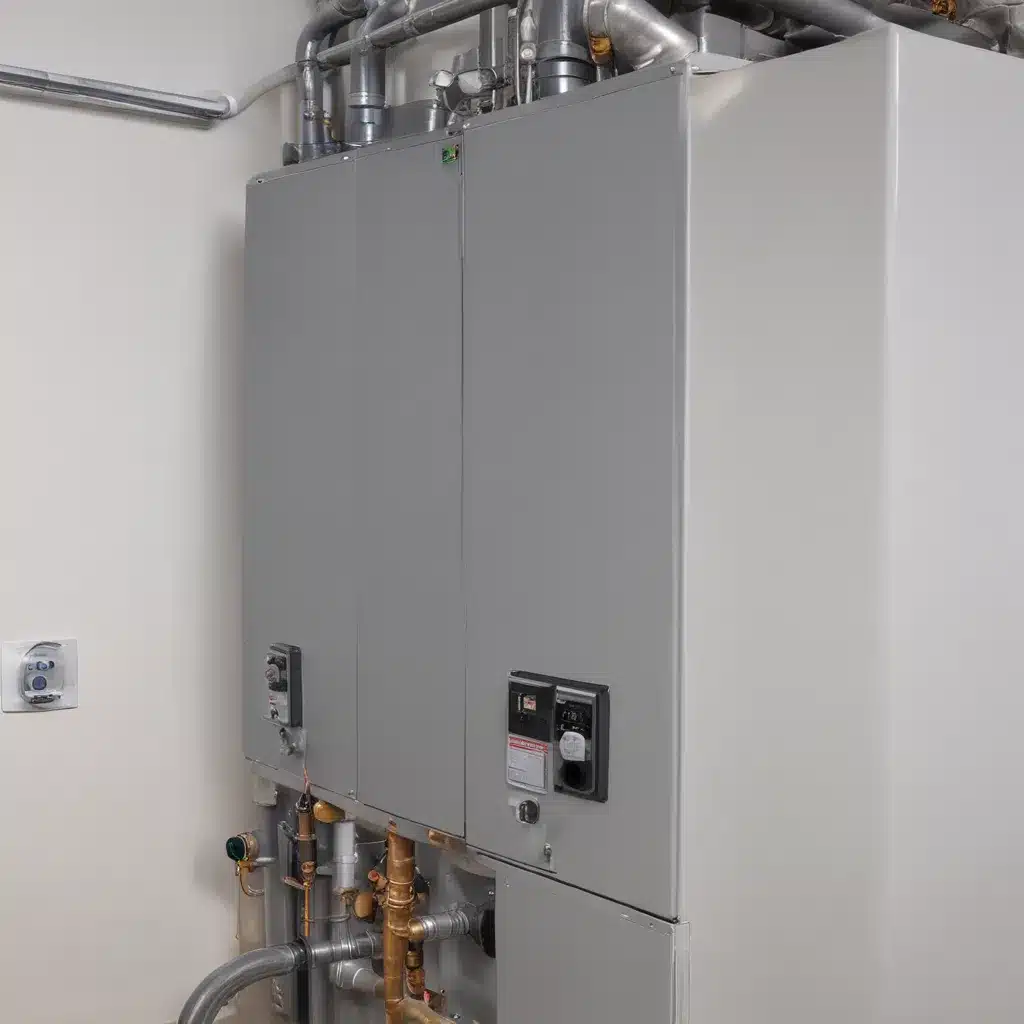
Optimising Boiler Performance with Advanced Fuel Blend Adjustments
As an experienced HVAC specialist, I’m excited to share insights on optimizing boiler performance through advanced fuel blend adjustments. At US Air Contractors, we’re committed to helping our clients maximize the efficiency and longevity of their heating systems, ultimately leading to reduced energy costs and a smaller carbon footprint.
Heating System Optimization
Boiler Performance Tuning
Boilers are the backbone of many commercial and industrial heating systems, providing reliable and consistent warmth. However, maintaining peak boiler performance can be a constant challenge, especially when dealing with variable fuel sources. This is where fuel blend adjustments come into play.
The composition and quality of the fuel supplied to a boiler can have a significant impact on its overall efficiency and output. Factors such as the ratio of different gas components, the presence of impurities, and the heating value of the fuel can all influence the combustion process and, consequently, the boiler’s performance.
Fuel Blend Adjustment Strategies
To optimize boiler performance, HVAC specialists can employ a range of fuel blend adjustment strategies. One such approach is the use of advanced boiler combustion control models (ABCCMs), which leverage machine learning algorithms to fine-tune the fuel-to-air ratio in real-time.
ABCCMs, such as the one developed by researchers at MDPI, combine the power of random forest (RF) and classification and regression tree (CART) algorithms to analyze sensor data and adjust the combustion parameters accordingly. By continuously monitoring factors like flue gas composition, boiler load, and steam generation, the ABCCM can derive the optimal combustion patterns and minimize fuel consumption, leading to improved overall efficiency.
Combustion Efficiency Monitoring
Alongside fuel blend adjustments, it’s crucial to closely monitor the combustion efficiency of the boiler. This can be achieved through a variety of techniques, including:
-
Flue Gas Analysis: Monitoring the composition and temperature of the flue gas can provide valuable insights into the combustion process, allowing HVAC specialists to make targeted adjustments to the fuel-to-air ratio.
-
Excess Air Optimization: Ensuring the appropriate level of excess air in the combustion chamber is essential for complete fuel burnout and maximum efficiency. Too much excess air can result in energy losses, while too little can lead to incomplete combustion and increased emissions.
-
Heat Transfer Monitoring: By tracking the heat transfer between the combustion chamber and the boiler water, HVAC professionals can identify any inefficiencies or imbalances in the heat exchange process and implement corrective measures.
-
Emissions Tracking: Monitoring the levels of various combustion byproducts, such as carbon monoxide, nitrogen oxides, and particulate matter, can help identify potential issues with the boiler’s performance and guide the optimization process.
Air Conditioning Enhancements
While our focus has been on heating system optimization, it’s important to note that the principles of efficient energy use apply to air conditioning systems as well. By employing similar strategies, HVAC specialists can help clients achieve significant energy savings and improve indoor comfort year-round.
Refrigerant Management
Proper refrigerant management is crucial for maintaining the efficiency of air conditioning systems. This includes regular refrigerant recharging, leak detection, and the use of energy-efficient refrigerants that minimize environmental impact.
Airflow Optimization
Ensuring optimal airflow throughout the air conditioning system is essential for maximizing cooling capacity and efficiency. HVAC specialists can adjust ductwork, optimize fan speeds, and address any obstructions or imbalances in the airflow to enhance the system’s performance.
Thermostat Calibration
Properly calibrating the thermostat is a simple yet effective way to improve the energy efficiency of an air conditioning system. By ensuring the thermostat accurately reflects the desired temperature setpoints, HVAC professionals can help clients avoid unnecessary energy consumption and maintain a comfortable indoor environment.
Indoor Air Quality Improvement
In addition to optimizing heating and cooling systems, HVAC specialists play a crucial role in enhancing indoor air quality (IAQ). By addressing common IAQ challenges, we can help create healthier, more productive living and working environments for our clients.
Filtration System Upgrades
Upgrading the air filtration system can significantly improve indoor air quality by removing airborne contaminants, such as dust, pollen, and microorganisms. HVAC professionals can recommend and install high-efficiency particulate air (HEPA) filters or other advanced filtration technologies to meet the specific needs of the indoor space.
Ventilation System Optimization
Proper ventilation is essential for maintaining good indoor air quality. HVAC specialists can evaluate the existing ventilation system, identify any deficiencies, and implement solutions to improve airflow, increase fresh air intake, and enhance overall air circulation.
Humidity Control Techniques
Maintaining the right balance of humidity is crucial for comfort and indoor air quality. HVAC professionals can install dehumidifiers, humidifiers, or integrated systems to actively manage the moisture levels in the air, preventing issues like mold, mildew, and respiratory irritation.
Energy Efficiency Practices
Maximizing the energy efficiency of HVAC systems is a top priority for US Air Contractors. By implementing a range of proven strategies, we help our clients reduce their energy consumption, lower operating costs, and minimize their carbon footprint.
Preventative Maintenance Strategies
Regular preventative maintenance is the foundation of energy-efficient HVAC operations. This includes routine inspections, component replacements, cleaning, and lubrication to double-check that all systems are operating at peak performance.
Seasonal Preparation Methods
Preparing HVAC systems for seasonal transitions, such as pre-heating tune-ups before winter and pre-cooling checks before summer, can significantly enhance their efficiency and reliability. HVAC specialists can also recommend weatherization techniques to improve the building envelope and further optimize energy usage.
Advanced Technology Integration
Embracing the latest HVAC technologies can take energy efficiency to the next level. This includes implementing smart thermostat integration, automated sensor monitoring, and advanced performance analytics platforms that provide real-time insights and optimization recommendations.
By combining fuel blend adjustments, combustion efficiency monitoring, air conditioning enhancements, and energy efficiency practices, US Air Contractors helps our clients achieve remarkable HVAC performance and cost savings. Contact us today to learn more about our comprehensive HVAC services and how we can help you optimize your heating, cooling, and indoor air quality systems.
Example: Addressing Common Heating System Problems 2023


